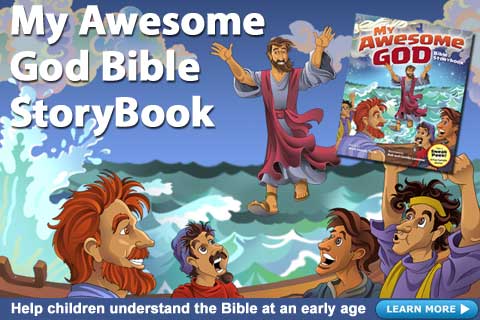“What meanings do children make of the Bible stories presented in Sunday school?”
Intro
A few summers ago I taught the Bible lessons at an academic enrichment camp for educationally disadvantaged children that was sponsored by my church. Every day I presented a new installment from the story of Joseph. On the morning after I had narrated the episode about Joseph’s resolute resistance to the temptations of Potiphar’s wife, a young girl came up to me and predicted with a smile and supreme confidence how she expected the story would turn out: “I think those two gonna get together.” This incident prompted me to consider how children actually experience the Bible stories that they read and hear in church and other Christian educational settings.
Two general conclusions become obvious: (a) children often interpret stories in highly individualistic ways, and (b) the meanings children make of stories are frequently not the meanings that storytellers or authors intended or expected them to make.
Because Bible stories constitute the primary subject matter for children’s instruction in many churches on Sunday mornings and because the meanings that children make of Bible stories significantly affect their ideas about God and Christian faith, it seems important to attend to what sense children are making of these stories. Are children in fact hearing the stories that teachers believe they are telling? What implications or inferences are children drawing from these narratives? To explore these issues, I designed a research project around the core question “What meanings do children make of the Bible stories presented in Sunday school?”
What Was Going On?
It became clear to me as I analyzed these children’s interactions with Bible stories that they generally constructed the kinds of meanings from Bible stories that they were invited to make. They generally attended to the information and the principles to which the leaders and teachers called their attention, and they tried to produce the answers or responses that the storytellers seemed to be seeking.
The children in this case study were most often invited either to recall specific information about the Bible stories or to respond personally to predetermined principles derived from the biblical narratives.
This is not to say that responses other than prompted or prescribed meanings never occurred. The difference is that invitations to respond to the Bible stories in original and creative ways were relatively infrequent, and even when they occurred, the discussions that ensued often seemed to be shut down prematurely, before the ideas proposed by the children had been fully explored. In addition, the children sometimes offered unique or divergent ideas that went unheard or unacknowledged.
Why Might This Be So?
Why might the children in this case study have been guided to engage in Bible stories so differently from the ways they are often encouraged to approach stories in other contexts?
- Time Constraints
- Default to the familiar
- Perceptions of Bible Stories
How Might It Be Different?
The experiences with Bible stories that were offered to the children in this case study reflect the perhaps tacitly held conviction that Bible stories are primarily examples or specific instances of general precepts, concepts, or principles. These propositions need to be distilled from the stories by a writer or storyteller prior to the presentation of the story, and then imparted to the children through a variety of learning activities, including but not limited to a narration of the story. The essential content in this approach is not the Bible story per se, but the principle derived from it.
However, this perception about the purpose for sharing Bible stories with children is open to question (a case that I build fully in the dissertation upon which this research is based). How might Bible teaching with children look different if direct, immediate, personal involvement with the narrative became the primary emphasis—in other words, if children were to be invited to experience Bible stories in church in a manner comparable to the way they encounter other stories in other settings?
Different use of time. Significant engagement with Bible stories requires ample time to savor details, experience emotions, and process reactions. Leaders might find it necessary to reduce the number and length of the games and projects that they incorporate into one class session if they hope to reclaim sufficient unhurried time for contemplation about the story. The frenetic (“high energy”) pace of activities in many contemporary Sunday schools does not give children a chance to think much or deeply about the stories; in fact, the rush of activities might actually encourage quick, unreflective, obvious answers.
Different questions. Although informational questions are helpful in recreating and clarifying the details of a story, they are not sufficient for enabling children to enter into the stories emotionally. More effective for this purpose are the kinds of questions to which the inquirer does not know the answers. If asked because the questioner really wants to know, they can lead to stimulating conversations not only between the asker and the respondents but also among all the individuals included in the dialogue. Interesting story talk might be elicited by asking such questions as:
• “How did you feel when . . . ?”
• “How might it have ended differently if . . . ?”
• “Who was your favorite person?”
• “What was the worst part?”
Different activities. In order to help children experience Bible stories more fully, program leaders might have to change the focus of the activities in which children participate before and after the presentation of the story. Rather than building activities around abstract concepts or themes suggested tangentially by the story, teachers and curriculum writers could search for activities that would help children relate more knowledgeably to the main story events. For example, drawing pictures or building models of Bible-time wells might help children understand more clearly stories about Isaac or the woman from Samaria.
Different preparation. Teachers will not be able to engage children in fascinated involvement with Bible stories until they have experienced the stories that way themselves. Preparation for this kind of teaching would require storytellers and small group leaders to “live in” the narratives themselves first, so that they would have their own experiences with the stories to share with their students.
Children are capable of experiencing stories in deeply personal and relational ways—but often they do so only when they are invited to. This case study suggests that Christian education efforts in the church may not be taking sufficient advantage of this capacity when sharing Bible stories with children.
The value of this study may lie more in the questions that it raises than in any definitive answers that it provides. What kinds of responses are Christian educators seeking from children when they tell them Bible stories? Are their teaching approaches consistent with the responses that they claim to seek?
To read more on the research project, download the article here.
__
About The Author:
Sharon Short (Ph.D., Talbot School of Theology, Biola University) has served as an educational ministry staff member in three different churches, an adjunct instructor in a Christian college, and a consultant for a Christian curriculum publisher. Currently she is pursuing a career as an online college professor and is working on various freelance writing projects. Email: sharonwshort@aol.com
Children’s Response to Bible Stories is taken from the Christian Education Journal, CEJ: Series 3, Vol. 8, No. 2 Copyright 2011; p 306-325. All rights reserved. Permission granted by Christian Education Journal.
Want to share this article outside of your ministry? Want to post this electronically? Please contact Dr. Kevin Lawson, Editor for permission Editor.cej@biola.edu.
Subscribe to Christian Education Journal: cej.subscriptions@biola.edu
__
Help children understand the Bible at an early age
Learning to enjoy the Bible at an early age is the first step to developing a lifelong habit of daily Bible reading. My Awesome God Bible Storybook will help children enjoy the Bible and help them hide His Word in their hearts. This 416-page Bible Storybook helps teachers and parents explain God’s Word in all its fullness. From Genesis to Revelation, My Awesome God Bible Storybook invites readers, young and old, to discover that God is truly awesome!







